
CRITIQUE OF ANTHROPOLOGY
Scope & Guideline
Exploring the Depths of Cultural Discourse
Introduction
Aims and Scopes
- Critical examination of energy transitions:
The journal frequently addresses the complexities of energy transitions, particularly in relation to social, political, and environmental implications. This includes discussions on renewable energy, extractivism, and the moral dimensions surrounding these transitions. - Interrogation of kinship and social relations:
A significant focus is placed on kinship, care, and social responsibility, examining how these concepts play out in various cultural contexts, especially in relation to gender, state policies, and historical legacies. - Exploration of postcolonial and neoliberal frameworks:
The journal critiques the influence of postcolonial and neoliberal ideologies on social structures and individual experiences, often analyzing the intersections of global capitalism and local practices. - Ethnographic engagement with marginalized communities:
'Critique of Anthropology' emphasizes ethnographic work that highlights the voices and experiences of marginalized groups, aiming to bring attention to their struggles and resilience in the face of systemic challenges. - Contemporary socio-political issues:
The journal remains engaged with pressing contemporary issues, including migration, environmental justice, and the politics of identity, ensuring that anthropological discourse remains relevant and impactful.
Trending and Emerging
- Environmental justice and sustainability:
There is a growing emphasis on environmental justice and sustainability, particularly in the context of energy transitions, resource extraction, and ecological practices. This trend highlights the need to critically examine the socio-political ramifications of environmental policies. - Decolonial frameworks and indigenous perspectives:
Emerging themes reflect a strong interest in decolonial approaches and indigenous perspectives, emphasizing the importance of understanding and respecting indigenous knowledge systems and practices in anthropological research. - Gender and kinship reconfigurations:
Recent works show an increased focus on the complexities of gender and kinship, particularly how these concepts are being reconfigured in response to contemporary social challenges such as migration, violence, and state policies. - Global migration and transnationalism:
The journal is increasingly addressing themes related to global migration and transnationalism, exploring how these phenomena impact identity, belonging, and social networks across borders. - Critical engagement with technology and capitalism:
There is an emerging trend of critically examining the role of technology and capitalism in shaping human experiences, with a focus on how these forces influence social relations and cultural practices in various contexts.
Declining or Waning
- Traditional ethnographic studies:
There appears to be a reduced emphasis on traditional ethnographic studies that do not critically engage with contemporary social issues. The journal's recent publications favor more innovative and critical approaches over conventional descriptive ethnography. - Focus on Western-centric narratives:
The journal has gradually moved away from anthropological analyses that center predominantly on Western contexts or perspectives, opting instead for a more global and inclusive approach that prioritizes non-Western experiences. - Historical anthropology:
Themes related to historical anthropology, particularly those that do not directly connect to current socio-political contexts, have become less prominent. The journal's focus has shifted towards contemporary issues and their implications for the present. - Static analyses of culture:
The journal is moving away from static analyses of cultural practices that do not consider the dynamic nature of culture in response to globalization, migration, and technological change. - Over-simplified representations of identity:
There is a noticeable decline in simplistic or monolithic representations of identity. Instead, the journal has been favoring more nuanced discussions that recognize the complexities and intersections of identity within socio-political contexts.
Similar Journals

Anthropology Today
Advancing Knowledge in Contemporary AnthropologyAnthropology Today, published by WILEY, is a leading peer-reviewed journal in the field of anthropology, boasting a distinguished Q1 category ranking in the 2023 evaluations and a notable position within the top 79th percentile of its discipline according to Scopus. Established in the United States, this journal offers a rich compendium of contemporary anthropological research, covering diverse topics that shape the understanding of human cultures and societies. It is recognized for its rigorous academic standards and commitment to publishing innovative studies that reflect current trends and discussions within the field. While the journal is not open access, it provides insightful articles and reviews that are indispensable for researchers, professionals, and students seeking to enhance their knowledge and stay updated with the latest anthropological findings and theoretical advancements.

Annual Review of Anthropology
Exploring the Depths of Human CultureAnnual Review of Anthropology is a premier journal published by Annual Reviews, dedicated to providing comprehensive and authoritative reviews in the field of anthropology. Established with the goal of synthesizing essential research findings, this influential publication not only shapes contemporary anthropological discourse but also facilitates interdisciplinary dialogue within the broader realm of social sciences and cultural studies. With an impressive impact factor that places it in the Q1 category across multiple classifications, including Anthropology and Arts and Humanities, this journal is highly regarded by researchers and academics alike. The Annual Review of Anthropology has been a trusted resource for critical insights and transformative ideas, helping to advance the understanding of human societies from 1980 to the present. Although it does not offer open access, access to its articles is available through various academic institutions, ensuring that both seasoned scholars and students can benefit from its wealth of knowledge. With a Scopus ranking placing it in the top percentiles for relevant subjects, this journal is essential reading for anyone looking to stay at the forefront of anthropological research.
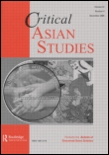
CRITICAL ASIAN STUDIES
Connecting Cultures, Politics, and Societies in AsiaCRITICAL ASIAN STUDIES is a leading academic journal published by Routledge Journals, Taylor & Francis Ltd, dedicated to exploring the complex social, cultural, and political dynamics of Asia. With an ISSN of 1467-2715 and an E-ISSN of 1472-6033, this journal serves as an essential resource for researchers and professionals interested in Asian studies, sociology, and geography. Boasting an impressive Q2 ranking in both Geography, Planning and Development, and Sociology and Political Science for 2023, it is recognized for its influential contributions to these fields. The journal’s accessibility options further enhance its appeal, allowing broader dissemination of critical research findings. Established in 1968 and continuing its rigorous publication through to 2024, CRITICAL ASIAN STUDIES facilitates in-depth dialogue and scholarship, thus playing a vital role in advancing understanding of Asian issues on a global scale.
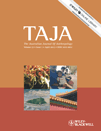
Australian Journal of Anthropology
Connecting Scholars, Enriching AnthropologyThe Australian Journal of Anthropology, published by Wiley, stands as a pivotal resource in the field of anthropology, reflecting a deep commitment to advancing scholarly discourse since its inception in 1990. With an ISSN of 1035-8811 and E-ISSN 1757-6547, this journal provides a platform for innovative research and critical analysis, contributing to the global anthropology community. Based in the United States, at 111 River St, Hoboken, NJ, it has established itself in the Q3 category of anthropology journals, ranking #162 out of 502 in Scopus, placing it in the 67th percentile among its peers. While it is not currently an open-access publication, the journal remains dedicated to accessibility through institutional subscriptions and provides a wealth of insight into anthropological methods and cultural studies. It seeks to foster interdisciplinary dialogue and promote a comprehensive understanding of social dynamics, making it an essential read for researchers, professionals, and students eager to enrich their knowledge and engage with contemporary anthropological issues.
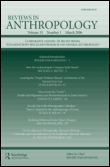
Reviews in Anthropology
Uncovering Insights that Shape Cultural UnderstandingReviews in Anthropology, published by Routledge Journals, Taylor & Francis Ltd, is a vital academic journal for scholars and practitioners in the fields of anthropology and cultural studies. With a history extending from 1974 to 2024, this journal reflects the evolving discourse within the social sciences, offering a collection of insightful reviews and critiques that shape contemporary anthropological thought. Although it operates under a non-open access model, its impact is underscored by its positioning in the Q3 quartile for both Anthropology and Cultural Studies, as well as respectable Scopus rankings. This journal serves as a platform for disseminating influential research, fostering academic dialogue, and enhancing understanding of diverse cultures and societies. Its robust editorial board and commitment to quality scholarship make it an essential resource for researchers, professionals, and students looking to deepen their knowledge and contribute to the ever-changing landscape of anthropology.
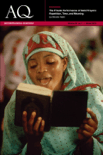
ANTHROPOLOGICAL QUARTERLY
Bridging Theory and Practice in Ethnographic ResearchANTHROPOLOGICAL QUARTERLY, published by the George Washington University Institute of Ethnographic Research, stands as a vital resource in the field of anthropology and broader arts and humanities studies. With an ISSN of 0003-5491 and an E-ISSN of 1534-1518, this esteemed journal has been contributing to academic discourse since its establishment in 1981. The journal holds a respected position in both the Q2 category for Anthropology and the Q2 category for Arts and Humanities (miscellaneous), demonstrating its impact and relevance, as evidenced by its rank of #152 out of 502 in the Social Sciences sector for anthropology and rank of #179 out of 552 in the Arts and Humanities field. Researchers, professionals, and students can rely on ANTHROPOLOGICAL QUARTERLY for rigorous peer-reviewed articles that push the boundaries of ethnographic research and anthropological theory, addressing contemporary issues with scholarly precision. The journal’s commitment to fostering critical analysis and interdisciplinary perspectives establishes it as an essential platform for advancing knowledge within its diverse and dynamic field.
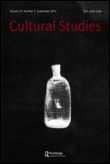
CULTURAL STUDIES
Charting New Territories in Cultural AnalysisCULTURAL STUDIES, published by Routledge Journals, Taylor & Francis Ltd, is a prestigious academic journal dedicated to the exploration and analysis of cultural phenomena across diverse contexts. With an ISSN of 0950-2386 and an E-ISSN of 1466-4348, this journal has established itself as a leading platform for scholars, researchers, and practitioners interested in the intersections of culture, identity, and society. Since its inception, CULTURAL STUDIES has transitioned through several converged years of publication, currently producing cutting-edge research that reflects its strong positions in Q1 quartiles across multiple disciplines, including Anthropology, Social Sciences, and Arts and Humanities. With an impressive Scopus rank of 75/1304 in Cultural Studies, the journal is an essential resource for those seeking to engage with the latest theoretical frameworks and methodologies in understanding cultural dynamics. Although it is not currently open access, CULTURAL STUDIES remains a critical vessel for disseminating knowledge that impacts both academic and practical applications in cultural analysis. For scholars and students eager to contribute to this vibrant field, the journal serves not only as a repository of knowledge but also as an inspiration for further inquiry into the complexities of culture.

AIBR-Revista de Antropologia Iberoamericana
Unveiling Cultural Narratives from Ibero-AmericaAIBR-Revista de Antropologia Iberoamericana is a premier scholarly journal published by the ASOC ANTROPOLOGOS IBEROAMERICANOS EN RED, dedicated to advancing research and discussion in the fields of Anthropology and Cultural Studies. Since becoming an Open Access publication in 2006, this journal has facilitated the dissemination of valuable insights and innovative perspectives, making its contributions widely accessible to scholars, professionals, and students alike. Based in Madrid, Spain, it serves as a crucial platform for anthropological research emanating from the Ibero-American context. The journal is recognized within the academic community, achieving a commendable Q2 ranking in both Anthropology and Cultural Studies categories as of 2023, and ranks favorably in Scopus, highlighting its significance and impact in the field. Researchers seeking to contribute or engage with contemporary anthropological discourse will find AIBR a critical resource for knowledge production and scholarly exchange.
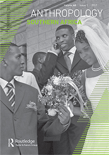
Anthropology Southern Africa
Illuminating the complexities of cultural phenomena in Southern Africa.Anthropology Southern Africa is a prestigious journal published by Routledge Journals, Taylor & Francis Ltd, and is dedicated to advancing the field of anthropology through rigorous scholarship and critical discourse. Established in 2013 and converging through 2024, this journal sets a high standard in its category, currently holding a Q2 classification in Anthropology and a Q1 ranking in Cultural Studies for the year 2023, ensuring its position as a significant contributor to social science research. With a robust Scopus ranking that places it in the 82nd percentile for Cultural Studies and the 67th percentile for Anthropology, Anthropology Southern Africa serves as an essential platform for researchers, professionals, and students engaged in anthropological inquiry and cultural analysis. Although it is not openly accessible, the publication prides itself on high-quality submissions that explore diverse cultural phenomena and anthropological perspectives, thereby inviting interdisciplinary engagement and fostering a global academic dialogue.

AMERICAN ETHNOLOGIST
Advancing Ethnological Insights Since 1974AMERICAN ETHNOLOGIST, published by Wiley, stands as a prominent platform in the field of anthropology, with a distinguished reputation underscored by its Q1 ranking in the 2023 Category Quartiles and a notable position in the 79th percentile among its peers. With its foundation dating back to 1974 and set to continue until 2024, this journal serves as a vital resource for researchers, practitioners, and students devoted to exploring cultural dynamics and social practices across diverse communities. The journal is characterized by its commitment to advancing theoretical discussions and empirical scholarship in ethnology and related disciplines. Targeted contributions include in-depth studies, critical reviews, and innovative methodologies that engage with pressing cultural issues. Although it does not offer Open Access, the journal’s rigorous peer-review process and high-impact articles ensure the dissemination of valuable insights, enhancing scholarly engagement and professional discourse. Its ISSN is 0094-0496 and E-ISSN is 1548-1425, emphasizing its dual format accessibility, which facilitates wider readership within the anthropology community.